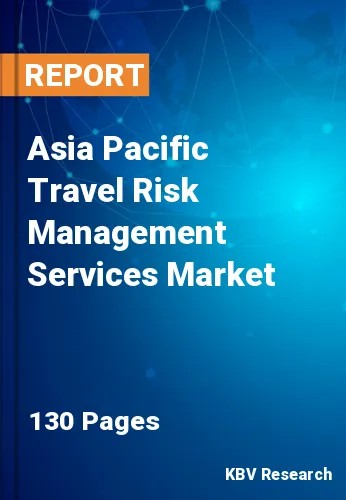The Asia Pacific Travel Risk Management Services Market would witness market growth of 8.5% CAGR during the forecast period (2023-2030).
Technology integration play a significant role in the industry, with the development of mobile apps and software platforms for travel risk assessment, tracking, and communication. Data analytics and artificial intelligence (AI) are increasingly used to analyze travel patterns and assess risks. Organizations recognize their duty of care responsibilities to protect the safety and well-being of their traveling employees. Employers seek comprehensive solutions for tracking and supporting employees on business trips. Geopolitical tensions and instability in various regions lead to increased demand for services that assess and mitigate political risks. Travel risk management providers expand their geopolitical intelligence capabilities. The frequency and severity of natural disasters lead to a focus on preparedness and response. Services that provide real-time monitoring of natural disasters and assistance with evacuations gained importance.
Travelers' environmental concerns lead to a demand for information on eco-friendly travel options and sustainable practices. Services that offer guidance on responsible and sustainable travel have gained traction. Effective crisis communication strategies have become essential for organizations. Services that assist with communication during emergencies see an increased demand. There is a growing emphasis on educating travelers and organizations about travel risks and safety measures. Training programs and resources are offered to enhance risk awareness. The expansion of remote work and flexible schedules altered travel patterns, increasing the frequency of short-term trips. Travel risk management services are adapted to cater to these evolving travel patterns.
International Data Corporation Japan estimates that the sector for cybersecurity products in Japan is worth $3.6 billion, up 16% over the previous year. Security issues, including phishing, malware, identity theft, and system breaches, increased dramatically across the nation as the pandemic changed work patterns from the office to online. The number of cybersecurity incidents and their impacts has also increased in Japan. These include ransomware attacks, theft of private information by APTs, and supply chain vulnerabilities brought on by attacks. Thus, the regional market will grow rapidly in the coming years, owing to all these factors.
The China market dominated the Asia Pacific Travel Risk Management Services Market by Country in 2022, and would continue to be a dominant market till 2030; thereby, achieving a market value of $20,396.2 million by 2030. The Japan market is registering a CAGR of 7.8% during (2023 - 2030). Additionally, The India market would showcase a CAGR of 9.1% during (2023 - 2030).
Based on Service Type, the market is segmented into Travel Security, Crisis Management, Data Security, Health Security, Assistance & Tracking and Others. Based on Enterprise Size, the market is segmented into Large Enterprises, Medium Enterprises and Small Enterprises. Based on Industry, the market is segmented into Agri, Food & Beverage, Pharmaceutical & Healthcare, Hospitality, Business Services & Consulting, IT, Technology & Telecom, and Others. Based on countries, the market is segmented into China, Japan, India, South Korea, Singapore, Malaysia, and Rest of Asia Pacific.
Free Valuable Insights: The Global Travel Risk Management Services Market is Predict to reach $188.9 Billion by 2030, at a CAGR of 8.1%
The market research report covers the analysis of key stake holders of the market. Key companies profiled in the report include FocusPoint International, Inc., BCD Group, Collinson International Limited, Tokio Marine Holdings, Inc., CWT Global B.V, Global Rescue LLC, Everbridge, Inc, Kroll, LLC, Chubb Limited, and Healix Group of companies.
By Service Type
By Enterprise Size
By Industry
By Country
Our team of dedicated experts can provide you with attractive expansion opportunities for your business.

